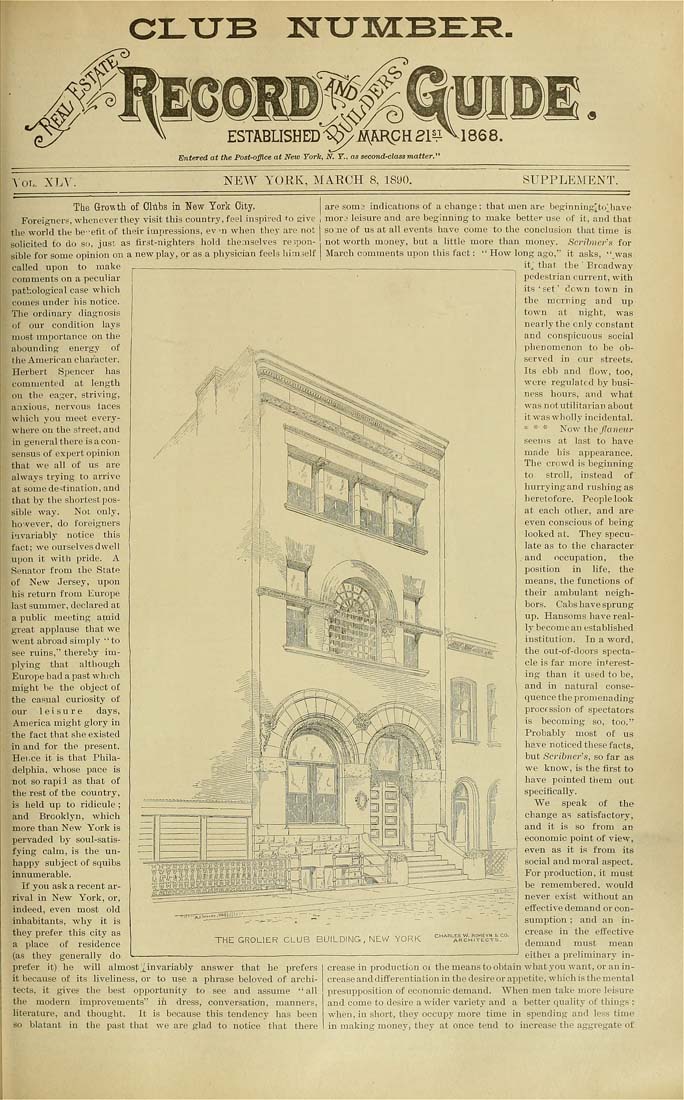Columbia University Libraries Digital Collections: The Real Estate Record
Use your browser's Print function to print these pages.
Real estate record and builders' guide: v. 45, no. 1147: March 8, 1890: Supplement

Text version:
Please note: this text may be incomplete. For more information about this OCR, view About OCR text.
ESTABLISHED-^i^ARCH 21^1868. Wntered at the Post-office at New York, N. Y.. as second-class matter." AoT,. XL\'. NEW YORK, MARCH 8, 1890. SUPPLEMENT. The Growth of Ghlbs in New York Oity, are soms inflicatiuns of a change; that men are beginning^toMiave Foreigners, whcncTev they visit this country, feel iiispiretl to sive , morj leisuve and are beginning to malie better use of it, and that the world tlie be-efit of their impressions, ev -n when they are nob j sone of us at all events have come to the conclusion that time is solicited to do su, jiisi as first-nighters hold themselves re;]->on- not worth money, hut a Uttle more than money. Scrihiiera for sible for some opinion on a new play, or as a physician feels !iim.5elf | March comments upon this fact: " How long ago," it asks, "was called upon to mate oomments on a peculiar pathological case which cornea under his notice. The ordinary diagnosis of our condition lays most importance on the aboun ding energy of tiie American character. Herbert Sjiencer has t'ommentt'd at length ou the eager, striviug, anxious, nervous iaces which you meet every¬ where on tbe street, and in general there is a con¬ sensus of expert opinion that we all of us are always trying to arrive at some deitinalion, and that by the shortest pos¬ sible way. Not only, however, do foreigners invariably notice this fact; we ourselves dwell uijon it with pride. A Senator from ihc State of New Jersey, upon his return frora Europe last summer, declared at a public meeting amid great applause that we went abroad simply "to see ruins," thereby im¬ plying that although Europe bad a past which might he the object of the casual curiosity of our leisure days, America might glory in the fact that she existed in and for the present. Hei.ce it is that Phila¬ delphia, whose pace is not so rapid as that of the rest of the country, is held up to ridicule; and Brooklyn, which more than New York is pervaded by soul-satis¬ fying calm, is the un¬ happy subject of squibe innumerable. If you ask a recent ar¬ rival in New York, or, indeed, even most old inhabitants, why it is they prefer this city ae a place of residence (as they generally do prefer it) he will almost2invariably THE GROLIER CLUB BUILDING, NLW YORK answer that he prefers it because of its liveliness, or to use a phrase beloved of archi¬ tects, it gives the best opportunity to see and assume "all the modern improvements" in dress, conversation, manners, literature, and thought. It is because this tendency has been so blatant in the past that we are glad to notice that there it^ thai the ' Broadway pedestrian current, with its'set' down town in the morning and up town at night, was nearly the cnly conslant and conspicuous social phenomenon to be ob¬ served ill cur streets. Its ebb and flow, too, wore regulated by busi¬ ness hours, and what wasnotutilitarian about it was wholly incidental. ^ * * Kow Miejloneiir seems at last to have made his appearance. The crowd is beginning to stroll, instead of hurrying and rushing ae heretofore. People look at each other, and are even conscious of being looked at. They specu¬ late as to the character and occupation, the position in life, the means, the functions of their ambulant neigh¬ bors. Cabs have sprung up. Hansoms have real¬ ly hecoinean established institution. In a word, the out-of-doors specta¬ cle is far more inierest- ing than it used to be, and in natural conse¬ quence the promenading procfssion of spectators is becoining so, too." Probably most of ue have noticed these facts, but Scribner's, so far as we know, is the first to have pointed tiiem out specifically. We speak of the change as satisfactoiy, and it is so from an economic point of view, even as it is from its social and moral aspect. For production, it must be remembered, would never exist without a.n effective deman d or con¬ sumption ; and an in¬ crease in the efi^ective demand must mean eithei a pi-elimiuary in¬ crease in production oi the means to obtain what you want, or an in¬ crease and difi'ercntiation in the desire or appetite, which is the mental presupposition of economic demand. When men take more leisure and come to desire a wider variety and a better quality of things ; when, in short, they occupy more time in spending and less time in making money, they at once tend to increase the aggregate of